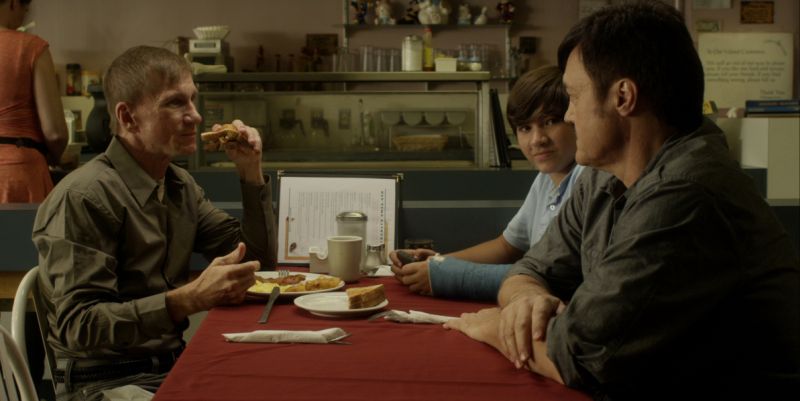HEIR: Excellent Modern Take On Body Horror

While many recent horror films have been heavily influenced by the works of prominent directors of the 1980s like David Lynch, John Carpenter and David Cronenberg (very good ones like The Guest and It Follows), this one addresses subject matter not even those films were willing to tackle.
Richard Powell’s Heir is the next great homage to those great directors, and can proudly be a part of the recent resurgence in thoughtful horror films designed more to represent real world conflicts as opposed to cheap scares. The plot is simple at first: a man arranges to give up his own son to a pedophile to satisfy his twisted urges. A chilling premise, but naturally these things never go as expected.
What I enjoyed most about Heir was how the narrative isn’t entirely linear. As our lead character Gordon (Robert Nolan) gets into a more agitated state, the cuts begin to reflect this, skipping forward in time or recalling events that have just happened. It keeps the audience perpetually in a state of tension without resorting to a jump scare. This ensures that there’s never a dull moment, even when things are kept intentionally vague to force the audience to guess what’s going to happen next.
Combining Horror Iconography With Real-World Issues
All the technical aspects of the film, from direction to cinematography to the score, deliberately invoke the neon lighting and synthesized scores we’ve come to expect from the greatest films of the genre, simply so we associate the classic iconography along with the very real condition of pedophilia. The characters of Gordon and Dennis are personified the way they are to show that it’s not the condition itself that makes someone a bad person, it’s choosing to give in to those impulses that makes you so.
The images and sounds makes us expect a Freddy Krueger or a Jason Voorhees, but instead all we get is an ordinary human being. This in turn leads to an even greater kind of dread, for what could possibly frighten a human being more than something that we have incorrectly assumed isn’t frightening at all?

Nolan’s performance is the absolute standout out of the three leads, playing Gordon with a hint of shame to ensure that his character is not just one-note. Special note should also be made for the effects here, which I genuinely could not tell whether they were practical or CGI. They aren’t just there for shock value, they also show the mental state of both protagonist and antagonist, showing how much they have surrendered to their impulses to hurt and maim and torture.
What Makes A Man A Monster?
Monsters in this film are those who have entirely lost any sense of morality or decency. Gordon sports a wound here that constantly bubbles up pus, which becomes more and more severe as he gets closer to giving up his own child to a pedophile. The contrast between him and Dennis (Bill Oberst Jr.), who is more than willing to hurt people with no remorse whatsoever, is between someone who knows what they want is wrong and someone who knows what they want is wrong…and does it anyway. Goodness is not always dictated by what you do, sometimes it’s about what you don’t do. The fact that it’s so clearly influenced by ’80s horror, which empathized becoming a monster as literally losing your humanity, is just the cherry on top.
It brings context to a very timely issue, considering how often we’re discovering crimes against children by those who we never expected to be depraved enough to commit such acts. From the infamous case of Jerry Sandusky to the chilling documentary Capturing The Friedmans, we’ve constantly seen examples of people being defended for their actions because of their impact on the community, we can only imagine a black-and-white sort of morality where blatantly evil people only do evil things.

The far scarier truth is that someone can be charitable and kind to some and still think it’s alright to hurt others simply because they want to. An even better example is last year’s excellent Best Picture winner Spotlight, which was less about the perpetrators themselves but the various people who knew about the massive abuse occurring and chose to ignore it. Those people may not have been hurting children themselves, but became an accomplice to those crimes by being unwilling to do anything about it. The most chilling line in that film, delivered by Stanley Tucci’s character: “If it takes a village to raise a child, it takes a village to abuse one.”
That line not only serves as the through-line and central message of Spotlight, but could also apply in a much smaller scale to Heir as well. Gordon may not be hurting his son himself, but by willingly giving him over to a known predator, he becomes an accomplice to the crime. As his hand spits out more and more pus, the message becomes clear: an accomplice is no better than the perpetrator.
It took a couple watches for everything about this film to click into place, but once it did, I discovered the next great horror film. Disturbing and yet profound at the same time, I would highly recommend Heir for any fans of horror, and for any fans of film overall.
Have you seen Heir? Could it be considered as a potentially great body horror film?
Heir is currently touring the festival circuit.
Does content like this matter to you?
Become a Member and support film journalism. Unlock access to all of Film Inquiry`s great articles. Join a community of like-minded readers who are passionate about cinema - get access to our private members Network, give back to independent filmmakers, and more.













